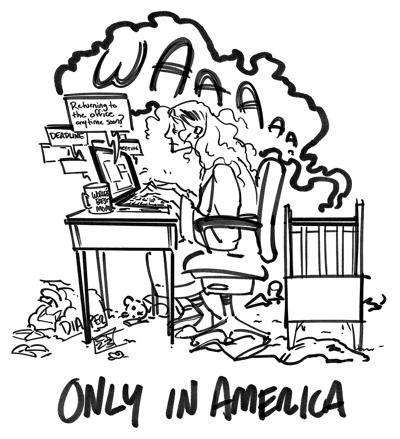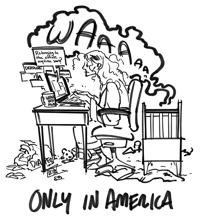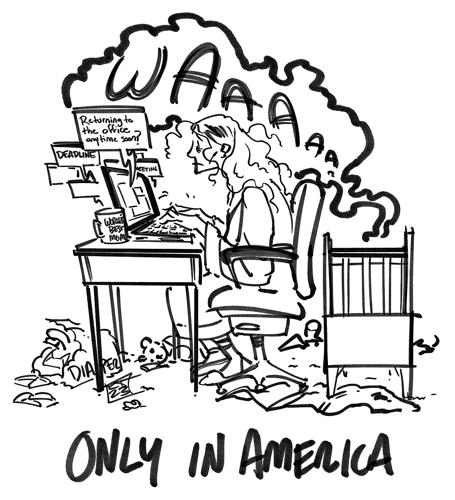This year marked my first year celebrating Mother’s Day from a new perspective – that of a mother.
I didn’t take becoming a parent lightly. I waited to start trying to conceive until I was as old as I thought I could be without facing too many risks to myself and my baby. I wanted time to prepare myself financially and mentally.
I wanted that extra preparation because even though being a parent anywhere has its challenges, the United States makes it particularly difficult.
Out of the 193 countries in the United Nations, 186 provide paid maternity leave and health benefits by law.
The United States is not one of them. In fact, the U.S. is the only industrialized country without any guaranteed paid parental leave at the national level.
Besides the U.S., only seven other countries in the U.N. don’t guarantee any paid family leave for mothers: Papua New Guinea, Suriname, Micronesia, the Marshall Islands, Nauru, Palau and Tonga.
That’s a list of nations that a vast majority of us probably couldn’t pinpoint on a map if our lives depended on it.
But the most glaring member of that list is us, the richest country in the world. That’s not exactly the kind of “American Exceptionalism” that makes my chest puff with patriotic pride. It’s a national embarrassment.
Sure, sure, we have the Family Medical Leave Act (FMLA), which provides 12 work weeks of unpaid job-protected leave during a 12-month period for the birth of a child.
But FMLA doesn’t apply to everyone. According to the federal Department of Labor, to qualify for FMLA you must:
■ Work at a company with 50 employees or more
■ Work at a location where the employer has at least 50 employees within 75 miles.
■ Have worked for your employer for at least 12 months.
■ Have worked at least 1,250 hours in the last 12 months (about 24 hours per week).
That’s quite a list of requirements just to be eligible for protection from being fired if you want to stay home for a few months with your newborn baby and physically recover from the birth.
I was lucky enough to have a workplace that allowed me to take 12 weeks off and to have saved up enough money to have the financial wherewithal to do so.
But for a lot of mothers, the luxury of taking time off work to heal is something they cannot afford, even if they are legally protected.
According to a report by LendingClub, around 64 percent of Americans are living paycheck to paycheck. Many families simply cannot afford for mothers to stop working, even for a few weeks. Especially with the astronomical medical bills they just incurred having that child.
According to a 2012 Department of Labor survey, nearly 12 percent of mothers went back to work within a week of giving birth and another 11 percent returned within two weeks.
The American College of Obstetricians and Gynecologists recommends mothers take at least six weeks off work following childbirth.
Mothers are literally risking their lives and health to go back to work because they can’t afford not to. And their children pay the price as well. Studies show that benefits of paid parental leave include a lowered infant mortality rate, increased likelihood of well-baby care doctor visits and vaccinations and increased likelihood and duration of breastfeeding.
And if you thought maternal leave was abysmal, paternal leave is even worse. Most fathers take 10 days or less. Even if fathers have the accrued leave and the financial ability to take it, many feel like they can’t take off without facing backlash at work.
My husband spent several years accruing leave at his work to be able to stay at home for the first six weeks of our son’s life, and I have no idea how we would have functioned if he hadn’t.
I had a cesarean section, and because of that, I had a difficult time performing normal tasks for weeks. I had to sleep in a recliner for two weeks because it was nearly impossible to get into and out of a lying position. I needed help getting out of the recliner for trips to the bathroom. I was constantly weak, tired and in pain.
Even with the two of us home taking turns feeding, burping, changing and calming the baby, we were both run ragged. The first six weeks passed faster than we thought possible. During that time, we kept looking at each other and asking, “How do mothers do this alone? How do parents survive with less parental leave than this? How do people go back to work after only a couple of days or weeks?”
During a time that was already difficult enough, the thought that we were lucky enough to be among some of the very few families who get to have both partners home for six weeks just made it all the more apparent how cruel our current system – or lack thereof – is.
Each year around Mother’s Day, it seems like everyone from politicians to celebrities to billion-dollar companies crow about how wonderful mothers are and how much they value them. I can’t count how many times I’ve heard a commercial enticing me to “This year get mom what she really wants.”
Do you know what moms really want? It’s not a diamond, a box of chocolates, a new robe, a bouquet of flowers or a card full of empty platitudes.
It’s paid parental leave.






